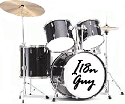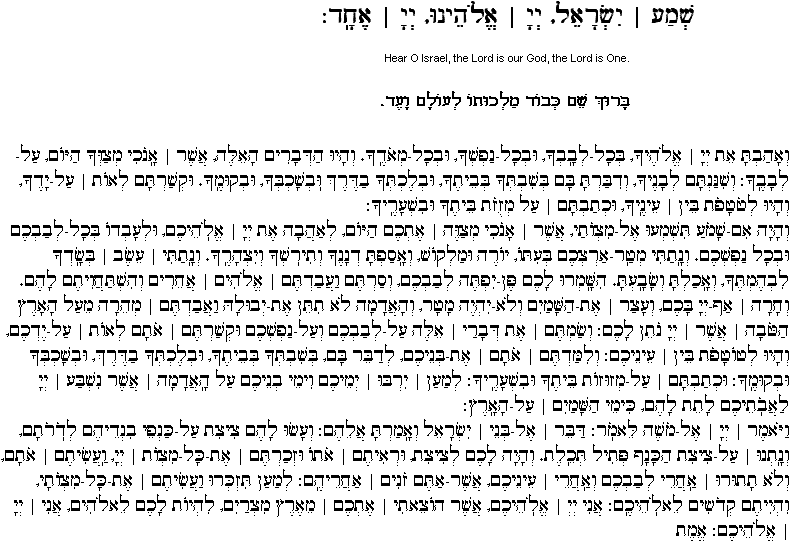
Example Hebrew Web Page
Prayer: Shema Yisrael
I am often asked for examples of how to produce a Web page for bidirectional languages such
as Hebrew or Arabic. This page contains one of the central prayers in the monotheistic Jewish religion, known as Shema Yisrael (or Shma Yisrael). It is named for
the opening two words. The prayer declares that there is one and only one God.
The page displays properly on modern browsers, providing you have a good quality Hebrew font. On poorer quality fonts, the spacing of the vowels
and other characters may not be esthetic. For example, the following table compares the Ezra font with the Times New Roman font.
The Meteg vowel " ֽ "
moves between two characters rather than aligning under the character "ח".
| Ezra font | Times New Roman Font |
|---|---|
Look at the source for this page, to see how it is implemented. I specified in the style section, some fonts that I have that
support Hebrew followed by some more traditional fonts.
I also specified the right to left direction with the CSS command "direction:rtl" for elements with the class = "he".
I entered the Hebrew characters in an editor that supports Unicode UTF-8. For example, Microsoft Notepad.
When you view the source, you will note that the characters are in a different order than when they are displayed on the Web page.
This is because the editor (unless you instruct it to do otherwise) defaults to a Left to right direction. The Hebrew characters will flow right to left, but punctuation and some
other characters that are not strongly right to left, may assume a left-to-right ordering. Of course, English characters (as used in HTML elements) are strongly left-to-right.
Move your cursor thru the Hebrew and English text (for example where I use the span="nobrk" to prevent a linebreak in the middle of a hyphenated word) and don't think about
left and right, but moving forward (with the cursor arrow) through the text.
For more details, see the Unicode Bidirectional Algorithm.
In creating this page, I looked in several prayer books and noted differences. The consonants and vowels were the same, but punctuation varied.
Not all the prayer books used the
Paseq "|" character. There were additional commas "," in some versions, and the character
Sof Pasuq "׃" and semi-colon ";" would be replaced by period "."
and comma "," respectively.
Note that since this text is a prayer and references the name of God, if you print this page, you are expected to treat it respectfully.
שְׁמַע | יִשְׂרָאֵל, יְיָ | אֱלֹהֵינוּ, יְיָ | אֶחָֽד:
Hear O Israel, the Lord is our God, the Lord is One.
